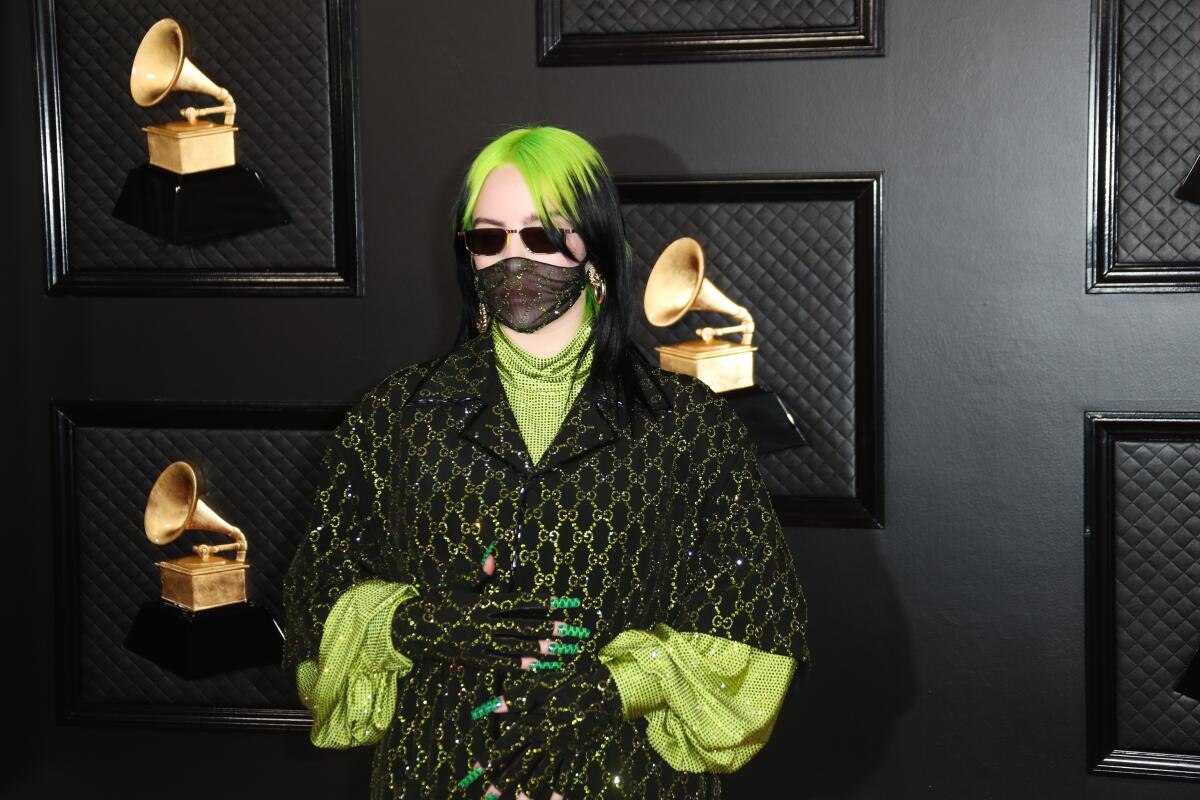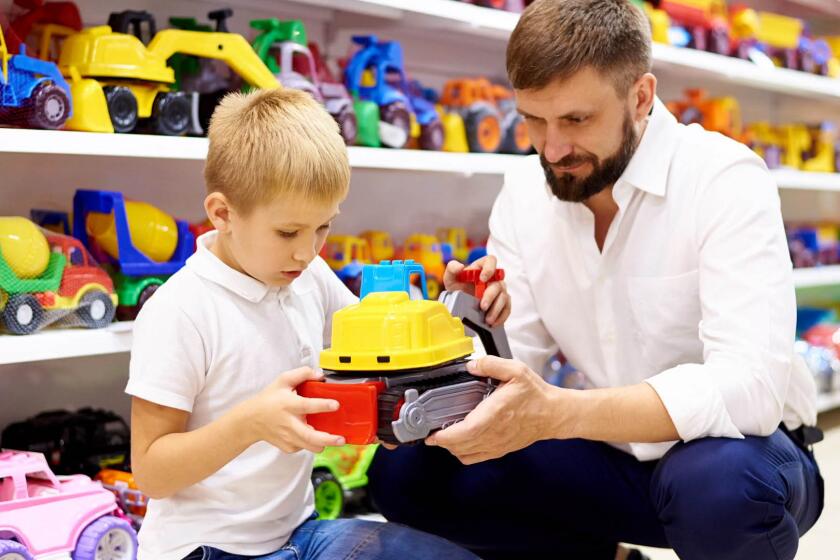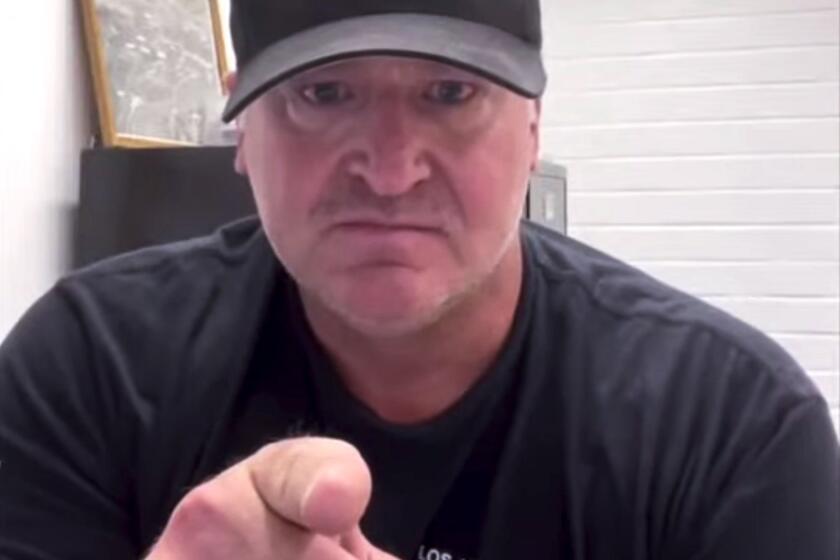Column: Tell your kids that Billie Eilish says porn destroyed her brain

- Share via
After her turn as host of “Saturday Night Live” last week, the pop star Billie Eilish sat down with Howard Stern on Monday for a long, intense interview on his SiriusXM radio show.
As always with Stern, talk turned to sex. And then to pornography.
The ensuing conversation generated many headlines.
Eilish, who turned 20 on Saturday, told Stern she began watching what she called “abusive pornography” when she was 11 years old. She eventually got to a point, she said, where she couldn’t watch anything else.
“Unless it was violent, I didn’t think it was attractive,” she said. “I used to be like the person who would, like, talk about porn all the time. I would be like, ‘Oh, it’s so stupid that anyone thinks that porn is bad … I think it’s cool and it’s great.’”
One day, she said, she even complained to her mother about a friend’s mom, who would not let her child watch porn.
“And my mom was like, ‘What?! Do you watch porn?’ And I was like, ‘How else am I supposed to learn how to have sex?’”
This is one of the saddest commentaries on adolescence that I have ever heard. The idea that a child would learn about what should be among the most joyous life experiences by watching men demean and hurt women is depressing.
When she had her first sexual relationships, she said, she emulated what she had seen and ended up doing things she did not want to do. I doubt she is alone. The proliferation of porn has warped how many young adults think about sex.
“If you’re not interested in being thrown around during sex, if you are not interested in being slapped and being choked, people are like, ‘You’re vanilla, you’re soft, you’re boring in bed,’” Eilish said. “Women are like, ‘Oh, I have to like being hurt to be thought of as good in bed.’”
Her habit came with a cost; porn was so unsettling to Eilish that she said she developed sleep paralysis, night terrors and nightmares. That doesn’t surprise me. No one, especially a child, can unsee images of sexual degradation or violence.
“I feel incredibly devastated that I was exposed to so much porn,” she said. “I think it really destroyed my brain.”
I take her point, but her brain seems just fine. After all, she has been called the most important pop star of her generation. She has been lauded for what Vogue has called her “total lack of sexualization in her aesthetic and emotionally intelligent lyrics.”
In a world where female pop stars sexualize themselves to the point of parody, she mostly refuses to play along, the occasional magazine spread notwithstanding. Her oddball fashion style — oversized pants and tops — has been a frequent subject of discussion. She says, simply, that her clothes are shapeless because she doesn’t want people to judge her or sexualize her. Perhaps this defense mechanism stems from her exposure to the unreal, plasticized female bodies that are a feature of so many porn videos.
“I never want the world to know everything about me. I mean, that’s why I wear big, baggy clothes,” she says in a recent commercial for Calvin Klein. Nobody can have an opinion about her body, she says, “because they haven’t seen what’s underneath.” (Irony alert: Yes, that is the same Calvin Klein who sexualized a 15-year-old Brooke Shields when he put her in a pair of skin-tight jeans in 1980. “You wanna know what comes between me and my Calvins?” she coos. “Nothing.”)
California becomes to first state to require large retailers to establish ‘gender neutral’ sections for kids. It’s a good, symbolic move.
Here is another irony: At the very moment porn has become so easy to access or stumble upon — and some are using it instructionally — fewer adolescents than ever are receiving formal sex education.
Planned Parenthood reports that “the vast majority” of parents support sex ed in middle and high school, and yet, according to the Centers for Disease Control and Prevention, fewer than half of high schools and only a fifth of middle schools teach comprehensive sex education, which includes information about birth control and sexually transmitted diseases, and what the CDC calls “critical communication and decision-making skills.”
That’s pretty depressing when you consider the barrage of sexualized content coming at kids from such sites as the hugely popular TikTok. In 2021, 63% of American kids between the ages of 12 and 17 used TikTok on a weekly basis. If you want to know where your middle-schooler learned to twerk like a pro, I suggest you check out her TikTok feed once in a while.
“I love TikTok, it brings me joy, it’s fun,” Eilish told Stern. But she is distressed by what she sees as “hyper-sexualization” on the platform.
“It’s horrible to me. People think it’s a kid’s app,” she said, but some of the content “is literally porn. That would traumatize me if I was a kid.”
About half of LAFD firefighters and LAPD officers refuse to vaccinate, for religious or political reasons, and are endangering the people they serve.
In 2017, the journal Pediatrics published an article called “Sexual Media and Childhood Well-being and Health.” Its authors cited studies that found that 42% of all American 10- to 17-year-olds have seen pornography online.
Other researchers have found that “sexting behaviors” were “significantly associated with the consumption of pornography” among a group of 329 adolescents whose mean age was just under 17.
Eilish deeply regrets her exposure to so much unhealthy sexual behavior, and the effects it had on her own relationships.
“I am so angry at myself for thinking it was OK,” she told Stern.
I think she has done us a favor with her candor. I mean, how often does a teachable moment about porn present itself?
Your kids know who Billie Eilish is. They probably admire her. Don’t let her valuable lesson go to waste.
More to Read
A cure for the common opinion
Get thought-provoking perspectives with our weekly newsletter.
You may occasionally receive promotional content from the Los Angeles Times.














